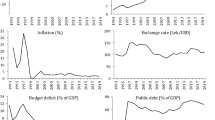Abstract
This paper investigates whether national elections in Europegenerate political cycles in other European countries, and, ifso, whether these spillover effects are likely to surviveinside EMU. The paper first tests whether elections in Germanyaffect macroeconomic outcomes in other European countries andthen investigates the impact of elections on budget deficits.The results indicate that German politics significantlyimpacts macroeconomic variables in other European countries,and also that politics significantly affects the behaviour ofEuropean budgetary policy. The prospect of elections tends toincrease public deficits in recessions, whereas left-winggovernments tend to be more deficit-prone than right-winggovernments regardless of the state of the economy. Moreover,the existence of political cycles spillovers among Europeancountries suggest that there may be a need for electoralcoordination.
Similar content being viewed by others
References
Alesina, A. (1987). Macroeconomic policy in a two-party system as a repeated game. Quarterly Journal of Economics 102: 651–678.
Alesina, A. and Roubini, N. (1992). Political cycles in OECD economies. Review of Economic Studies 59: 663–688.
Alesina, A., Cohen, G. and Roubini, N. (1992). Macroeconomic policy and elections in OECD democracies. Economics and Politics 4: 1–30.
Alesina, A., Cohen, G. and Roubini, N. (1993). Electoral business cycles in industrial democracies. European Journal of Political Economy 9: 1–25.
Alesina, A. and Perrotti, R. (1995). The political economy of budget deficits. IMF Staff papers 42: 1–32.
Alesina, A., Roubini, N. and Cohen, G. (1997). Political cycles and the macroeconomy. Cambridge, MA: MIT Press.
Barro, R. (1988). U.S. deficits since World War I. Scandinavian Journal of Economics 88: 195–222.
Buti, M. and Sapir, A. (Eds.) (1998). Economic policy in EMU. Oxford: Oxford University Press.
Cukierman, A. and Meltzer, A.H. (1986). A positive theory of discretionary policy, the costs of democratic government, and the benefits of a constitution. Economic Inquiry 24: 367–388.
Hibbs, D. (1977). Political parties and macroeconomic policy. The American Politican Sciences Review 71: 1467–1487.
Kiefer, D. (2000). Activist macroeconomic policy, election effects and the formation of expectations: Evidence from OECD economies. Economics and Politics 12: 137–154.
Lindbeck, A. (1976). Stabilization policies in open economies with endogeneous politicians. American Economic Review Papers and Proceedings 66: 1–19.
Nordhaus, W. (1975). The political business cycles. Review of Economic Studies 42: 169–190.
Persson, T. and Tabellini, G. (1990). Macroeconomic policy, credibility and politics. London: Harwood Academic Publishers.
Rogoff, K. (1990). Equilibrium political budget cycles. American Economic Review 80: 21–36.
Rogoff, K. and Sibert, A. (1988). Equilibrium political business cycles. Review of Economic Studies 55: 1–16.
Sapir, A. and Sekkat, K. (1999). Optimum electoral areas: Should Europe adopt a single election day? European Economic Review 43: 1595–1619.
Author information
Authors and Affiliations
Rights and permissions
About this article
Cite this article
Sapir, A., Sekkat, K. Political Cycles, Fiscal Deficits, and Output Spillovers in Europe. Public Choice 111, 195–205 (2002). https://doi.org/10.1023/A:1015149412127
Issue Date:
DOI: https://doi.org/10.1023/A:1015149412127




